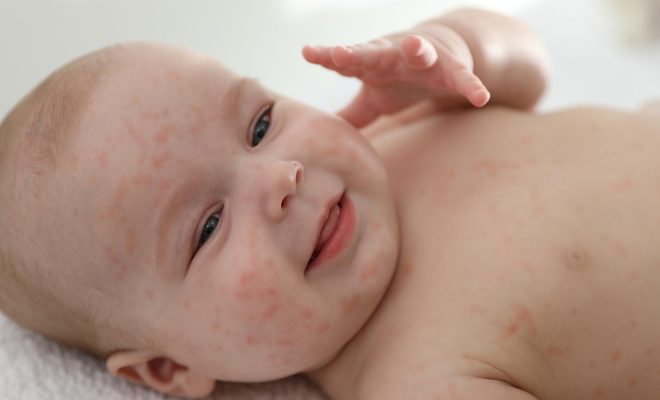How to Know if a Baby Has Food Allergies

Introduction:
Food allergies affect people of all ages. It is crucial to detect these allergies as early as possible, especially in babies, to prevent potential risks and ensure their well-being. In this article, we will discuss how you can identify if a baby has food allergies and the steps to take in such situations.
Identifying Symptoms of Food Allergies in Babies:
1. Skin reactions: One of the most common signs of food allergies in babies is skin reactions. This can include hives, eczema, redness, or swelling around the baby’s mouth or face.
2. Gastrointestinal symptoms: Babies with food allergies may also experience upset stomachs, vomiting, diarrhea, or bloody stools.
3. Respiratory symptoms: Wheezing, coughing, nasal congestion or a runny nose can also be an indicator of a food allergy.
4. Irritability and mood changes: A baby might become increasingly fussy and irritable after being exposed to specific foods they are allergic to.
5. Poor growth and weight gain: If the baby is allergic to certain food items present in their diet, it might affect their growth and cause inadequate weight gain.
Consulting a Healthcare Professional:
If your baby experiences these symptoms after eating certain foods they have never consumed before or regularly, it is important to consult a healthcare professional immediately. A pediatrician or an allergist will perform necessary tests like skin prick tests or blood tests to determine if your baby has any food allergies.
Introducing Solid Foods:
When introducing solid foods to your baby’s diet for the first time around age 6 months, focus on one new food item at a time to monitor any potential reactions carefully. This approach will make it easier for you to identify which foods might be causing the allergic reaction.
Managing Food Allergies in Babies:
1. Elimination diets: Upon receiving a diagnosis, it is crucial to eliminate those specific allergens from the baby’s diet and opt for alternatives. Read food labels vigilantly to ensure that allergens are not present in the ingredients list.
2. Education: Educating yourself and caregivers on how to recognize and treat food allergies is essential. Train yourself on using an epinephrine auto-injector if prescribed by the healthcare professional for your baby.
3. Allergen introduction: Under the guidance of a pediatrician or allergist, parents may slowly reintroduce the allergen into their baby’s diet, as controlled exposure may help in building tolerance over time.
Conclusion:
Early detection and management of food allergies in your baby can help prevent complications and allow them to enjoy a healthier and happier childhood. Consult with healthcare professionals, adhere to their guidelines, and educate yourself on food allergies to create a safe environment for your child.

